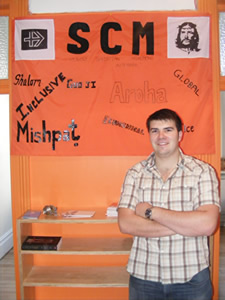Student christian movement seeks to create positive change in communities
 Is Christianity on the way out? Neill Ballantyne, the National Secretary of the Student Christian Movement, doesn’t think so. He discusses stereotypes around Christianity and invites students to consider joining the “middle ground” between conservative Christianity and New Atheism
Is Christianity on the way out? Neill Ballantyne, the National Secretary of the Student Christian Movement, doesn’t think so. He discusses stereotypes around Christianity and invites students to consider joining the “middle ground” between conservative Christianity and New Atheism
“God is dead” was a concept famously proposed by a character in one of Neitche’s philosophical works, Thus Spoke Zarathustra. It introduced a worldview where the concept of God, (especially a Christian God) no longer held any sway over people’s moral or ethical choices. This wasn’t a new idea as it underpinned the 18th Century ‘Enlightenment’ period where the power of reason, science and intellectual debate was favoured over superstition or religion. A natural extension of this thought was ‘secularisation theory,’ the idea that as societies ‘progress’ and modernise, religion will lose authority in all aspects of civic and social life and would thus eventually die-out.
But is God really dead and is society becoming less religious? According to the 2006 census, only 34% of the New Zealand population ticked no religion, a fairly small number when one considers that the Enlightenment has had more than 200 years to abolish religion. This is especially interesting as New Zealand is seen as one of the most intentionally ‘secular’ countries in the world, it is also seen as a developed and well educated country, where secularisation should be at its height. Religion still
even has a part to play in politics, with a prayer being said in our parliament every sitting day, and religious groups constantly lobbying and consulting with government on a range of issues.
It is clear that issues of faith and belief are still alive and well in New Zealand, the question remains about what this looks like on the ground. In regards to Christianity, there is an overall negative trend of religious affiliation with ‘mainstream’ denominations such as Anglicans, Presbyterians and Methodists all in decline. However there is remarkable growth in ‘newer’ churches such as affiliation with Evangelical, Born Again and Fundamentalist religions increasing by 25.6%, and affiliation with
Pentecostal religions increased by 17.8% between 2001 and 2006. This is especially noticeable on our tertiary campuses where practically all student Christian groups are Evangelical, Born Again, Fundamentalist or Pentecostal.
Is this problematic? In short, yes it is. All of these four Christian groups are often stereotyped (usually for good reason) as being conservative, homophobic, sexist and/ or “bible-bashing”. They have a wealth of resources and staff and are very strategic in the way they promote their activities and how they recruit their members. Unfortunately most students see their activities, are rightly disconcerted by the way they operate, and assume that all Christianity is ‘like-that.’
Fortunately, they are wrong. There is a middle ground between conservative Christianity and New Atheism. The Student Christian Movement (SCM) Aotearoa has been encouraging students to think for themselves about faith since 1896. SCM doesn’t impose doctrine put rather provides a non-judgmental environment for all students to think about the ‘big questions.’ We are student-led, so don’t have a hierarchical structure and we have a strong focus on social-justice, with the aim of creating positive change in our communities. We are also the only GLBT-affirming student Christian group in New Zealand.
We are currently in a rebuilding phase and would love you to join with us.
For more information see our website: www.scm.org.nz or email the National Secretary:
[email protected]
loading...
loading...
Tags: christinanity



Voices of our community